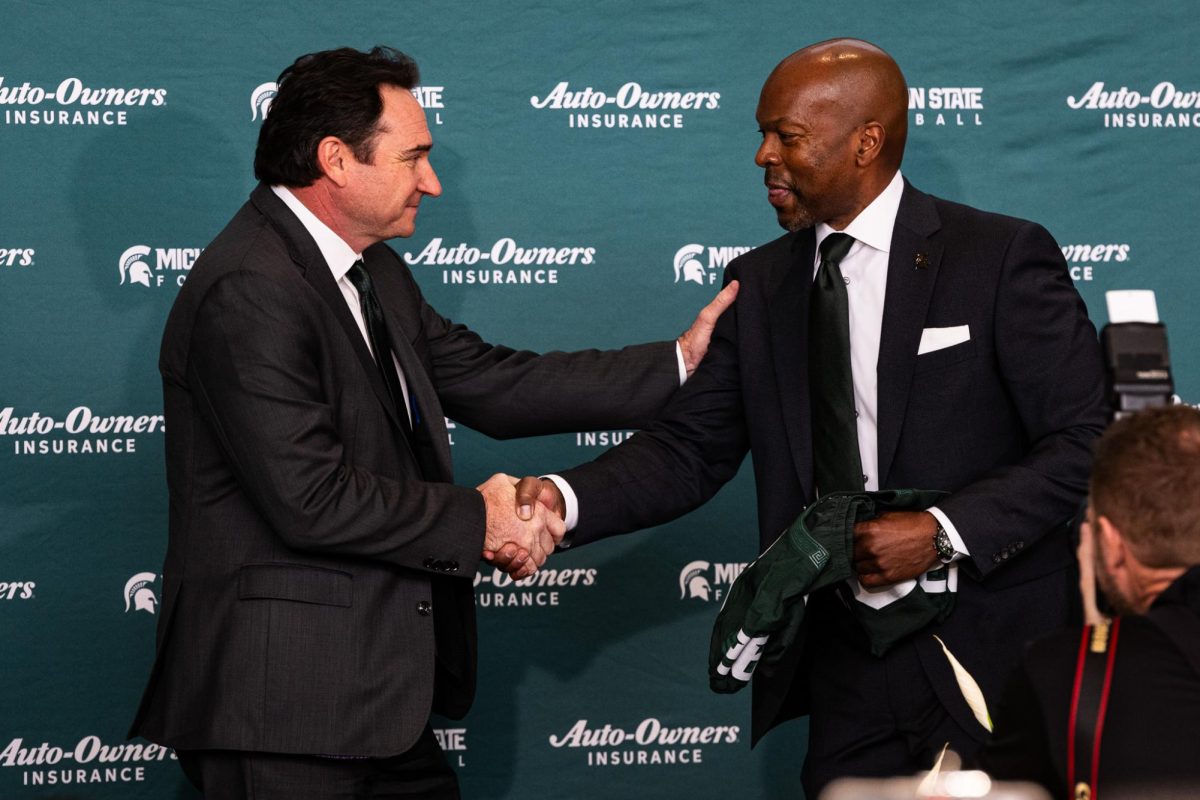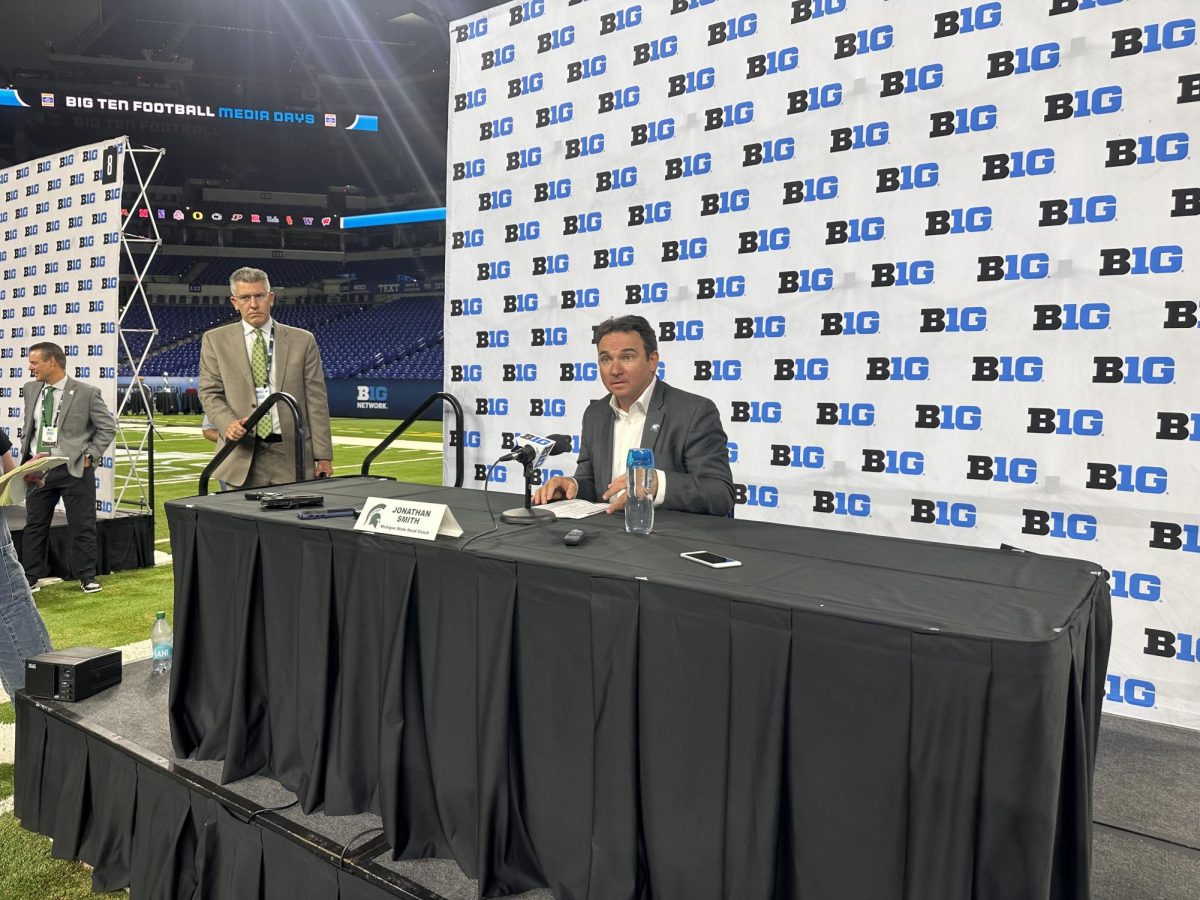Detroit Tigers’ Postseason Report Card
November 15, 2013
As November arrives and seasons change, another year of Tigers baseball ends on a dull note. A preseason favorite to win the World Series, Detroit once again fell flat.
What went wrong? The hitting? The team who was first in hits and batting average in 2013 and second in OBP and SLG? That lineup?
Or was it the pitching? The Cy Young laden team with one man already claiming the trophy and the other a day away? A team that broke the MLB record for strikeouts in a single season with 1,428? That doesn’t make sense either.
So let’s start pointing fingers and giving grades. Judging by this team’s atrocious performance in the ALCS, I’m sure we’ll find someone to blame. Detroit, the report card grades are out. Your parents won’t like it.
Starting Pitching: A-
I feel bad for the Tigers rotation, I really do. They’re that nerd in the group project who did all the work, and all the other group members had to do is turn in the assignment to get a good grade. Yet the slacker named…lets call him Jose…dropped the assignment and it fell down a stairwell. And the rotation just sighs and tries again tomorrow…to the same result.
The starting pitching was unreal. It almost wasn’t fair. Max Scherzer, Justin Verlander, and Anibal Sanchez proved themselves as the best 1-2-3 combo in the MLB. Twice Detroit brought no-hitters into the seventh inning, and, in Game 1 of the ALCS, made it 8 1/3 before Daniel Nava slapped a single to break it up.
For an example of their absolute dominance, Verlander pitched three games in the 2013 postseason. Check out his stats for those starts:
|
IP |
H |
R |
ER |
BB |
K |
HR |
PC-Strikes |
ERA |
Game 2 ALDS
|
7.0 |
4 |
0 |
0 |
1 |
11 |
0 |
117-73 |
0.00 |
GAme 5 ALDS
|
8.0 |
2 |
0 |
0 |
1 |
10 |
0 |
111-76 |
0.00 |
Game 3 ALCS
|
8.0 |
4 |
1 |
1 |
1 |
10 |
1 |
120-85 |
1.13 |
Verlander’s final line for the postseason? 23 innings pitched, 10 hits, 31 strikeouts, 0.39 ERA and a 0.57 WHIP.
His most important stat may have been 1-2, the Win/Loss record for Detroit in games he started. The bats, as usual, let Verlander down during the postseason. He was given run support in one of those three games, and only three runs total in his three starts.
Scherzer and Sanchez, naturally, were also dominant in their starts. Scherzer struck out 34 over 22 innings in the postseason and finished with a 1.03 WHIP. Sanchez started Game 1 of the ALCS and was part of Detroit’s MLB record 17 strikeout performance in a single game. Anibal pitched six innings of no-hit baseball, but had to exit early due to a high pitch count. In three starts, he only pitched 16 innings.
If there was one criticism for the rotation, it was the lack of getting runners out early in the count. Detroit is known for their strikeout and power pitching, but lack of exact control in that aspect can run the pitch count up fast. Sanchez pitched a no-hitter into the sixth inning in Game 1 of the ALCS, but couldn’t continue due to his high pitch count. Scherzer, the probable Cy Young winner, has never pitched a complete game, and some have argued that his high pitch count may have contributed to two big losses down the stretch.
What do we mean? How could a pitch count affect the outcome of a game? Well, bad news Detroit. You won’t like this one.
Relief Pitching/Closing: D
Ortiz crushing souls and grand slams in Game 2 of the ALCS, putting Boston up 6-5 in a thriller.
No, that grade isn’t harsh. It might not be harsh enough. Detroit had a problem with shaky relief pitching throughout the 2013 regular season, and even dating back 2012. Dombrowski had two years to sign a competent relief pitcher, someone who wouldn’t put a meatball down the plate with David Ortiz up to bat. The rotation for the Tigers posted a 2.06 ERA in the ALCS. The bullpen ERA? 4.97.
And if you’re looking for a place to point fingers for the lack of new hardware in the trophy case, this bullpen is a good place to start.
We talked earlier of pitch counts in Scherzer and Sanchez running too high, too early in games. While that stat is meaningless with good relief pitching, fouling and taking pitches led to nothing but good things for the Boston Red Sox.
Twice, Scherzer was taken out before disaster. In Game 2, Max was pulled after seven innings with a pitch count of 108 and a four-run lead. A little high, but nothing Max couldn’t have handled for one more inning. If the bullpen took care of business like Leyland expected, this conversation wouldn’t be taking place. However, Jose Veras, Drew Smyly, and Al Albuquerque all gave up either a hit or a walk in the inning to load the bases. Two outs, bases loaded, Ortiz coming to the plate.
And we all know the rest. Because we had to sit through it twice.
In the even more important Game 5, Scherzer made it through 6 1/3 before being pulled. With two men on, Smyly got Jacoby Ellsbury to hit a ground ball, but the sure handed Jose Iglesias couldn’t make the play. Bases loaded. It was like watching a replay. Veras was then put in for Detroit, and the softball pitch to Shane Victorino put Boston into the World Series.
Two grand slams, both by relief pitching, both in the seventh or later. The 2013-14 offseason might be time to clean the gutter.
Tigers’ Bats/Lineup: B
This is a hard grade to give. There were three different types of hitters in October for the Detroit. So collectively, they get a B, but lets split them up into letter grades.
B+: First, you had your consistent players; your Miguel Cabrera’s, Jose Iglesias’, and Alex Avila’s. They all gave production mostly similar to what they were expected to do. Iglesias made some nice plays (with the bat, mind you…not the ball), Avila got on base when he needed, and Cabrera is…well..Cabrera. Some might argue that Avila doesn’t deserve to be in this list with a .161 batting average, but what pushes him over the edge was a .350 OBP. In a series where base runners were at a premium, Avila took pitches and drew walks like only a veteran knows how.
A: Next up, your stars (and potential series-savers during the ALDS): Jhonny Peralta, Victor Martinez, and Austin Jackson. Yes, Jackson made the list. Martinez’s and Peralta’s performances speak for themselves. A combined 28 hits and 11 RBI’s between the two makes them easy choices for a top grade.
But for Jackson? He figured things out at the right time. You can talk about the the Oakland series, when Jackson was three for his first 33 plate appearances. But the fact of the matter is Jackson came alive when the Tigers needed it the most. In Games 4-6 of the ALCS, Jackson was batting .666 with two RBI’s in the eight spot. And more importantly, no strikeouts. Teams aren’t scrutinized when they win games, but rather when they lose. Jackson gave life to a team in its most crucial moments. Sadly, it was too little too late.
C-: Prince Fielder, Omar Infante, Torii Hunter. There isn’t much good to say about Fielder. When you’re batting cleanup, you essentially have one job: get RBI’s. Fielder, in the 2013 playoffs, had a grand total of zero. That stat, combined with a .250 slugging percentage and the fact that all connections with the ball were groundouts to the first baseman, puts Fielder in the bottom of the barrel. Torii Hunter and Omar Infante both had averages at the .200 level with OBP’s just a hair above at .250-.260. Not terrible for Infante, but with Hunter batting before Cabrera, that’s a stat that you look back and know it hurt the Tigers.
Coaching Staff: B-
It hurts to talk bad about Jim Leyland so soon after his departure, so let’s talk about the staff’s good moves instead. Austin Jackson. No production from the leadoff position. Leyland has taken criticism from reporters about his lineup from day one in Detroit. With Jackson grossly underperforming, Leyland moved him to the eight spot for Game 4 of the ALCS. With an adjusted lineup with Torii batting first and Cabrera second, the Tigers cruised to a 7-3 victory.
Leyland’s a genius.
Ok, skip, we talked about the good stuff. Now let’s get to the bad.
Dealing with relief pitching is the most controversial job of a head coach. The player does well, and you’re a wizard for choosing correctly. If the player does poorly, say, give up a game-tying eighth inning grand slam, you might be criticized a bit. And this happened to Leyland. Twice. Both times Leyland had Scherzer in a late-inning situation and chose to take him out in favor of his bullpen.
Leyland likes to play the “lefty-righty” game. Right-handed pitcher? Well, his average is lower against lefties, so let’s put Phil Coke in for one batter. Next batter is the opposite? Well Coke, you just struck out a batter on three pitches, but it’s time to come out. Sometimes it seems Leyland over-coaches, and it came back to bite him in the ALCS.
As was the case in Game 2. In the eighth inning, Detroit had four different pitchers see six Boston hitters — with a four-run lead. Leyland brought in Veras for two batters, Smyly for one, Alburquerque for two, and Benoit for two, one of those being David Ortiz. Smyly, arguably the Tigers’ best setup man, was up for one batter and promptly sat down because he gave up a walk.
Final Grade: B
Well Tigers, you passed the class. Congratulations. You also failed the final exam. At this point for Detroit, anything less than a championship is disappointment. This team has too many weapons, both pitching and hitting, for anything less than a World Series ring to be considered success. Leyland is gone, Scherzer may be leaving, and this team is fast showing they’re a jack of all trades, master of none. 2013 was the Tigers’ year. If they hope to be successful, a bullpen is the beginning and end in 2014. Brad Ausmus, you’re the man. A fresh young spark in a team of veterans may be just what this team needs.
Richie Cozzolino is the host of Tiger Talk for Impact Sports





























